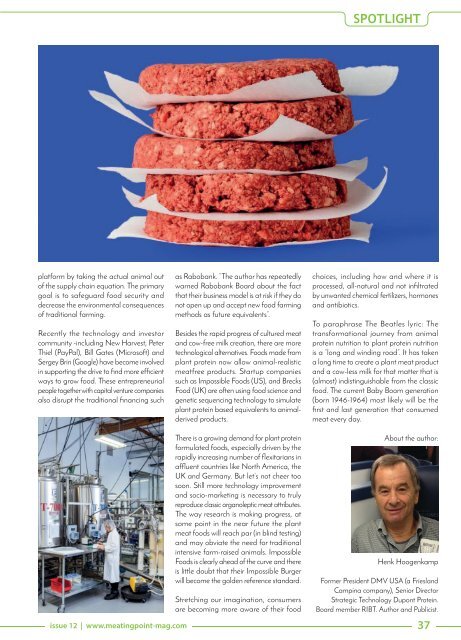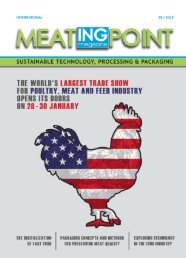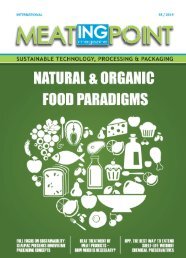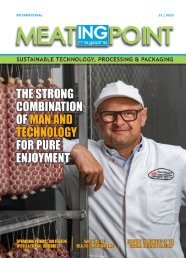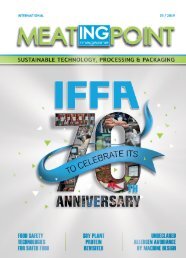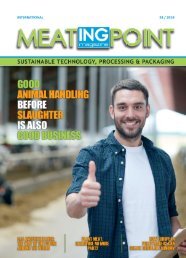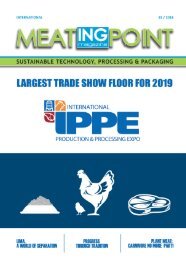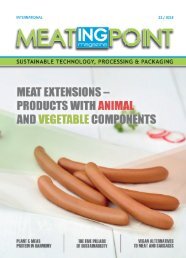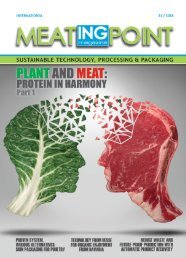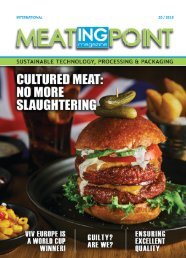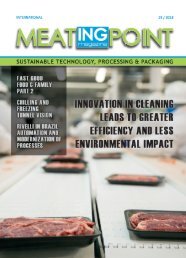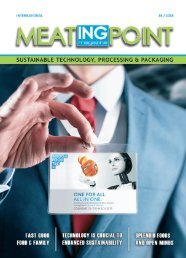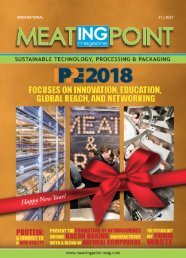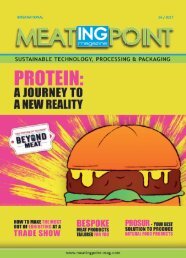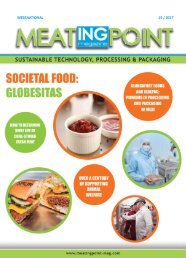MEATing POINT Magazine: #12 / 2017
Create successful ePaper yourself
Turn your PDF publications into a flip-book with our unique Google optimized e-Paper software.
SPOTLIGHT<br />
platform by taking the actual animal out<br />
of the supply chain equation. The primary<br />
goal is to safeguard food security and<br />
decrease the environmental consequences<br />
of traditional farming.<br />
Recently the technology and investor<br />
community -including New Harvest, Peter<br />
Thiel (PayPal), Bill Gates (Microsoft) and<br />
Sergey Brin (Google) have become involved<br />
in supporting the drive to find more efficient<br />
ways to grow food. These entrepreneurial<br />
people together with capital venture companies<br />
also disrupt the traditional financing such<br />
as Rabobank. “The author has repeatedly<br />
warned Rabobank Board about the fact<br />
that their business model is at risk if they do<br />
not open up and accept new food farming<br />
methods as future equivalents”.<br />
Besides the rapid progress of cultured meat<br />
and cow-free milk creation, there are more<br />
technological alternatives. Foods made from<br />
plant protein now allow animal-realistic<br />
meatfree products. Startup companies<br />
such as Impossible Foods (US), and Brecks<br />
Food (UK) are often using food science and<br />
genetic sequencing technology to simulate<br />
plant protein based equivalents to animalderived<br />
products.<br />
choices, including how and where it is<br />
processed, all-natural and not infiltrated<br />
by unwanted chemical fertilizers, hormones<br />
and antibiotics.<br />
To paraphrase The Beatles lyric: The<br />
transformational journey from animal<br />
protein nutrition to plant protein nutrition<br />
is a “long and winding road”. It has taken<br />
a long time to create a plant meat product<br />
and a cow-less milk for that matter that is<br />
(almost) indistinguishable from the classic<br />
food. The current Baby Boom generation<br />
(born 1946-1964) most likely will be the<br />
first and last generation that consumed<br />
meat every day.<br />
issue 12 | www.meatingpoint-mag.com<br />
There is a growing demand for plant protein<br />
formulated foods, especially driven by the<br />
rapidly increasing number of flexitarians in<br />
affluent countries like North America, the<br />
UK and Germany. But let’s not cheer too<br />
soon. Still more technology improvement<br />
and socio-marketing is necessary to truly<br />
reproduce classic organoleptic meat attributes.<br />
The way research is making progress, at<br />
some point in the near future the plant<br />
meat foods will reach par (in blind testing)<br />
and may obviate the need for traditional<br />
intensive farm-raised animals. Impossible<br />
Foods is clearly ahead of the curve and there<br />
is little doubt that their Impossible Burger<br />
will become the golden reference standard.<br />
Stretching our imagination, consumers<br />
are becoming more aware of their food<br />
About the author:<br />
Henk Hoogenkamp<br />
Former President DMV USA (a Friesland<br />
Campina company), Senior Director<br />
Strategic Technology Dupont Protein.<br />
Board member RIBT. Author and Publicist.<br />
37


